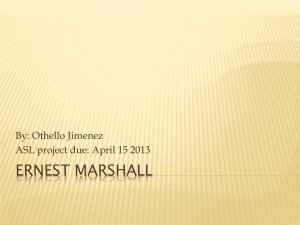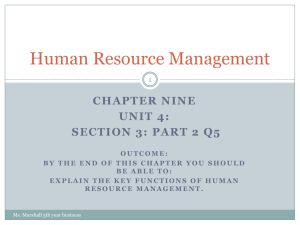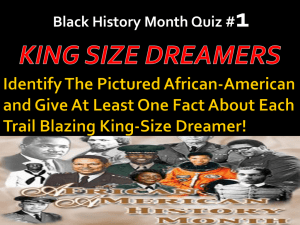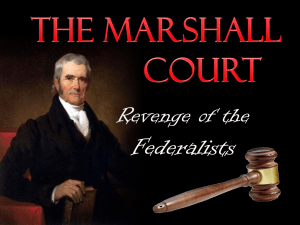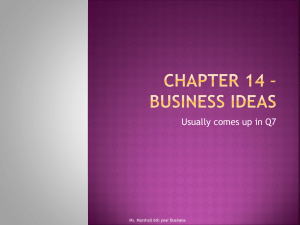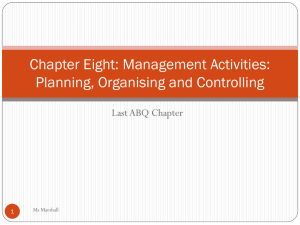Chapter Four - Enterprise
advertisement
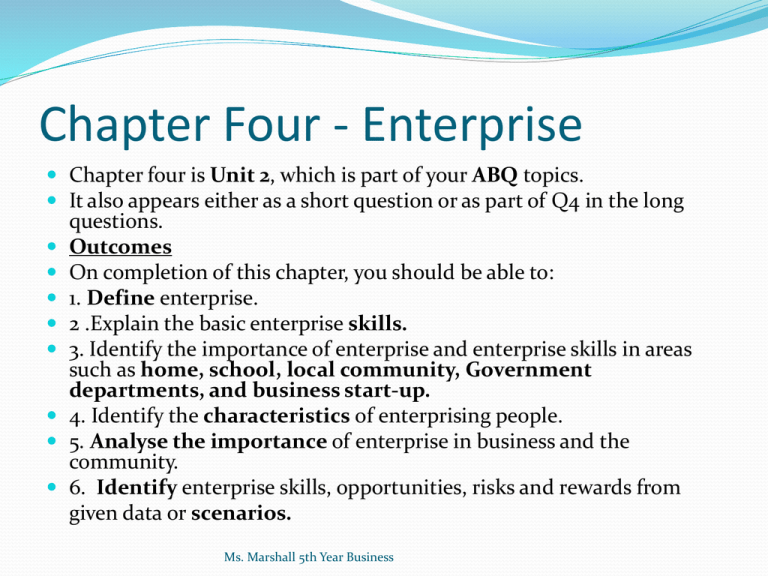
Chapter Four - Enterprise Chapter four is Unit 2, which is part of your ABQ topics. It also appears either as a short question or as part of Q4 in the long questions. Outcomes On completion of this chapter, you should be able to: 1. Define enterprise. 2 .Explain the basic enterprise skills. 3. Identify the importance of enterprise and enterprise skills in areas such as home, school, local community, Government departments, and business start-up. 4. Identify the characteristics of enterprising people. 5. Analyse the importance of enterprise in business and the community. 6. Identify enterprise skills, opportunities, risks and rewards from given data or scenarios. Ms. Marshall 5th Year Business Enterprise Enterprise involves using your initiative to identify some need and then taking the steps to satisfy that need. It involves taking financial and personal risk. Successful enterprises are rewarded with profit. Examples of Enterprise: Personal Enterprise – Enrolling in a night class. Business Enterprise – Diversification into new markets/new products, e.g. iPad-Apple. Government Enterprise – “The Gathering” initiative to promote tourism. Social Enterprise- Special Olympics. Ms. Marshall 5th Year Business Area Enterprise Business Start Up Entrepreneur Spots an opportunity and takes the initiative to set up a business in order to make a profit. They take financial and personal risk. E.g. Richard Branson set up Virgin Airlines after he flying with another company and feeling that the service wasn’t good enough. Enterprise in different areas Home Growing your own vegetables, renovating using your own DIY skills, knitting or sewing instead of buying some clothes and household items. School TY mini-enterprise, after school drama club, study groups. Community (Social Enterprise) Many community enterprises are set up to meet some need rather than to make profit. E.g. Organisations such as the GAA, Tidy Towns and St. Vincent de Paul. Government Sometimes the Govt. has to take the initiative to encourage enterprise or even to set up businesses themselves. E.g. the Gathering should encourage tourism. CEB encourage job creation at a local level. Local councils organise community festivals. Coillte was set up by the State Ms. Marshall 5th Year Business to develop forestry. Enterprise Skills Skills are abilities that we have. Some are innate and some have to be learned through practice. 1. Human Relations 2. Time Management This is covered very well in your textbook page 65 3. Planning to page 71. Make sure you can outline each 4. Risk management skill and apply it to the 5. Decision Making different areas. 6. Reality Perception Ms. Marshall 5th Year Business Enterprise skills in Business Start up Skill Enterprise Human Relations Persuading investors to give you capital in order to set up your business. Time The entrepreneur draws up a schedule to ensure the shop is Management decorated, stocked and ready in time for its opening. Planning The entrepreneur does a business plan and cash flow forecast. Risk The entrepreneur takes out public liability insurance because Management members of the public will be on her premises. Decision Making The entrepreneur decides to be sole trader/partner/private limited co. Reality Perception The entrepreneur drops an idea that she has realised is not working, e.g. stocking an unpopular product, dropping an ineffective ad campaign. Ms. Marshall 5th Year Business Enterprise Skills in the Home Skill Human Relations Time Management Planning Risk Management Decision Making Reality Perception Ms. Marshall 5th Year Business Enterprise skills in School Skill Human Relations Time Management Planning Risk Management Decision Making Reality Perception Ms. Marshall 5th Year Business Enterprise Skills in the Community Skill Human Relations Time Management Planning Risk Management Decision Making Reality Perception Ms. Marshall 5th Year Business Enterprise skills in the Government Skill Human Relations Time Management Planning Risk Management Decision Making Reality Perception Ms. Marshall 5th Year Business Enterprise Characteristics “Characteristics” refers to personality traits. Some common personality traits amongst entrepreneurs are: Pro-active Independent See page 65 of your Self-Motivated textbook for an Self-Belief outline of those not in bold Need for achievement/Ambitious Risk Taker Ruthless Decisive Creative Ms. Marshall 5th Year Business The Importance of Enterprise in Business Intrapreneurship: is an employee within a business who shows enterprise. He uses his initiative and thinks of a new idea which may cut costs or increase sales and profits. For example, Art Fry inventing the Post it. Why is enterprise important in business? It is essential, it sets the business up in the first place. Intrapreneurs have ideas that can cut costs or increase sales and profits. Enterprise leads to the creation of wealth. Profits and wages earned as a result of enterprise lead to more spending, hence creating more job opportunities. Tax intake to the government increases, leading to more grants to help more businesses. Ms. Marshall 5th Year Business The Importance of Enterprise in the Community Creates jobs leading to a higher standard of living in the community. Knock on effect for local businesses, as local people spend more money in their shops, pubs, hotels etc. It creates a new breed of entrepreneurs. People see others who are successful and are inspired by this. The government receives taxes. Less in being paid out on social welfare meaning more is available for local amenities. Infrastructure improves. New houses and roads are built as an area prospers. Ms. Marshall 5th Year Business Recent Exam Questions 2012/2006 10 marks Illustrate your understanding of the term enterprise. 2011 20 marks Colm has decided to form a tidy towns committee in his local village and enter the ‘tidiest village’ category of the National Tidy Towns competition in 2013. Discuss four entrepreneurial skills that Colm will require in developing this local community initiative. 2010 ABQ 5 marks Explain the term ‘intrapreneur’ Ms. Marshall 5th Year Business Recent Exam Questions 2009 10 marks Illustrate the difference between enterprise and management. 2008/2004 10 marks (a) Intrapreneurship is…. (b) State two examples of intrapreneurship. 2008 15 marks “Being decisive, creative and being prepared to take risks are personal characteristics often associated with entrepreneurs”. Discuss these characteristics and support your answer with examples. Ms. Marshall 5th Year Business Recent Exam Questions 2007 15 marks Describe three enterprise skills required of an entrepreneur. 2006 20 marks Using examples, analyse the importance of four different enterprising skills and relate two to business and two to the community. NOTE: Chapter 4 has come up in the following ABQ’s: 2010, 2009, 2005 and 2004. Chapter 4 was a full exam question in 2003 (Q4). Ms. Marshall 5th Year Business



